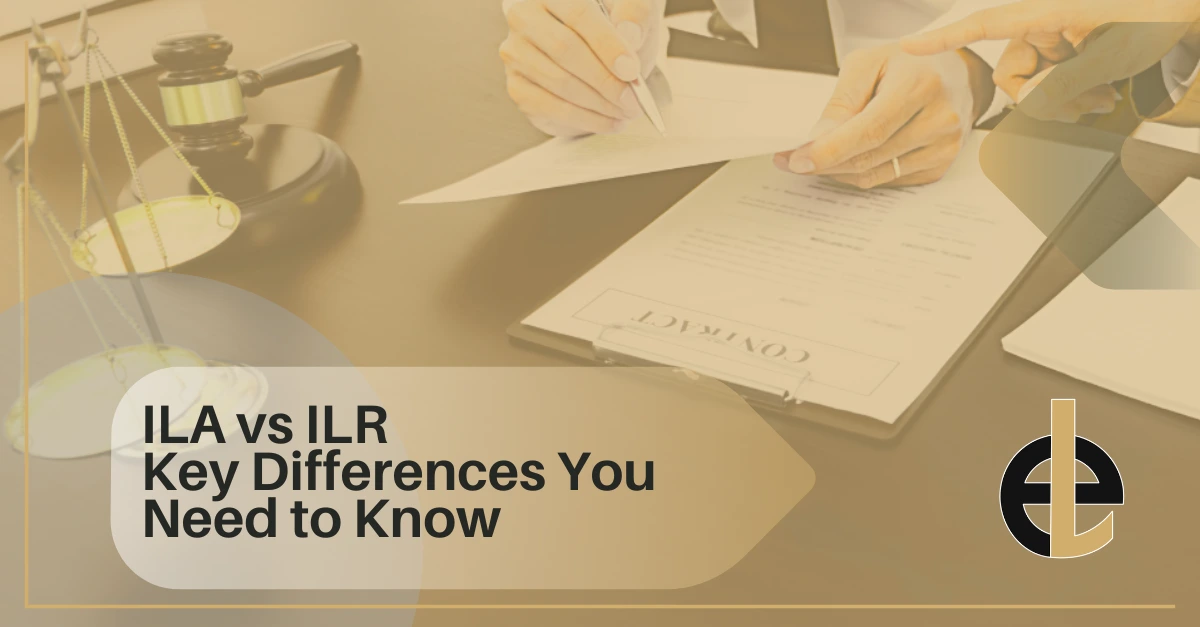
Knowing your legal rights and having strong support always matters. You get proper guidance on legal issues of buying a home or dealing with immigration law. When it comes to getting legal help from a law firm in Ontario, two terms you may hear in these situations are Independent Legal Advice (ILA) and Independent Legal Representation (ILR).
Though they sound similar, they serve different roles. This guide will help you break down ILA vs ILR, detail the differences, and guide you on when each one is the best choice for your case.
ILA means that a lawyer takes time to explain a legal document to you in clear terms. The lawyer works just for you and not for anyone else involved. When you go for Independent Legal Advice in Burlington, your legal expert makes sure that you know what you will agree to.

They inform you about potential risks and your rights. This can be especially useful in cases like adding a name to house title in Ontario, where legal changes must be clearly understood. After they explain everything, they may sign a form to show you received proper advice. This helps protect you, more so in cases where one side may have more power than the other.
ILR is when a lawyer acts for you fully from start to finish. They go beyond just explaining the law. They speak and act for you. When it comes to Independent Legal Representation in Burlington, the services you opt for also involve getting letters, negotiating with the other side, and even legal counsel in court.
ILR is helpful in more complex matters like estate planning, where many steps are involved. When both sides in a case or deal need their own lawyer, ILR protects your interests.
ILA and ILR are both important in legal matters, but their purpose differs. Each offers its own kind of help, which depends on what is happening and what you need.

The kind of support you choose can also depend on things like processing time, especially when deadlines are tight or decisions take a while. To decide which is best for you, it helps to look at a few key highlights of ILA vs ILR.
The key aspect in ILA vs ILR is how involved the lawyer is in your case. With ILA, the lawyer’s job is focused. They meet with you once, go over your document, answer your questions, and make sure you know everything before you sign. That’s usually where their work ends.
With ILR, the lawyer gets involved in every part of your legal matter. They can give advice, speak for you, and handle all back-and-forth talks with others. If needed, they’ll go to court or help you fight for your rights. For example, if you’re trying to get residency permits, ILR ensures that your case is handled properly at every stage. This kind of support is helpful when you want someone by your side the whole way.
ILA usually happens at a very specific time—just before something is signed. You might only need it for an hour or two. It’s often used in deals where one person needs to understand a paper they’re signing, such as giving up rights or transferring property. It’s short and focused.
That said, when you compare ILA and ILR, representation starts much earlier and lasts longer. Your lawyer helps from the first step all the way to the end. For example, if you have a matter involving types of title transfers in Ontario, the application process and timelines must be carefully handled. Your lawyer helps you understand the rules and prepare your documents, and finally follows up on the results.
ILA helps protect clients who might not fully understand what they are signing, as the lawyer explains the documents and confirms that everything is fair. This is often required when power is unbalanced between two people or when someone could be giving up big rights.
When it comes to ILA vs ILR, the latter covers much more ground. It is a practical step when legal rules are harder to get to the bottom of, or when things can change as you go. If you are dealing with legal procedures, a lawyer working for you can take care of the many steps and deadlines. They make sure everything is done properly so that you get the best possible outcome.
The right path is often ILA when there is potential risk that one person could be taken advantage of, a common situation in will and estate administration. The lawyer giving ILA must not be connected to the other party, so that there is no conflict of interest.

ILR goes beyond this. One of the notable differences between ILA and ILR is that here, the lawyer is truly on your side throughout the process. They are not just checking that things are fair, but fighting for what is in your best interest. ILR is often necessary in common real estate disputes, where the law can get tricky and your position needs to be defended clearly. If you are in a case where approval criteria are strict, ILR gives you a fair chance and a strong voice, no matter how complex the situation is.
When it comes to independent legal advice, the support is short-term. The lawyer’s job is done once they explain the document and make sure that you understand it. You do not keep working with them unless a new issue comes up and you decide to hire them again.
On the other hand, ILR gives you help that continues over time. Your lawyer is there to answer questions and make a case for you, which is vital in legal cases that go on for weeks or even months. The long-term support is especially useful in case you are working through renewal policies. Your ILR expert can help track timelines and file forms. They also respond to questions that come up at any stage.
Legal help comes in many forms. Some legal issues can be solved with just advice and understanding, while others need more hands-on help and someone to speak on your behalf. Moving from advice to full representation often happens when the issue becomes more complex or when you face legal challenges that need real support. Knowing when to make that move helps you stay in control.
Our team is here to guide you every step of the way, whether you need advice or full support through your case. We take the time to explain your rights through each part of the process.
Reach out to Estofa Law today to book a consult and get the legal help that fits your needs.
5500 North Service Road Suite 300-27, Burlington, ON L7L 6W6
Estofa Law is a real estate law firm dedicated to serving clients in Burlington, Oakville, Milton, Hamilton, and Toronto.
Copyright © 2025 | Estofa Law Professional Corporation | All Rights Reserved